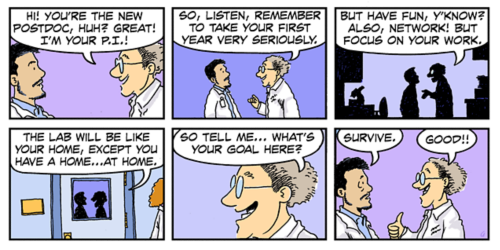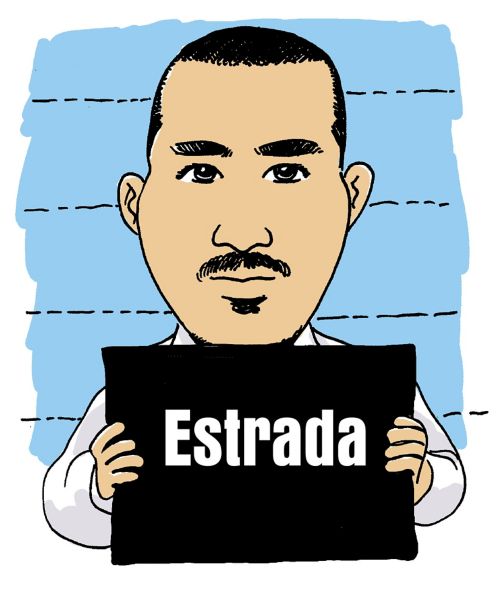St. Jude Family of Websites
Explore our cutting edge research, world-class patient care, career opportunities and more.
St. Jude Children's Research Hospital Home

- Fundraising
St. Jude Family of Websites
Explore our cutting edge research, world-class patient care, career opportunities and more.
St. Jude Children's Research Hospital Home

- Fundraising
Postdoc survival guide: On the road to big discovery, you’re allowed to stumble on your first steps

Congratulations — you just received your PhD.
You were a contributor to your field of study, learned how to navigate personalities and egos, and completed some of the most productive years of your education.
You now enter the realm of the postdoctoral fellow, and it can feel like you’re starting over. You go from being one of the top dogs and most knowledgeable students in your former lab to a new environment, where you’ll encounter colleagues with similar accolades and levels of expertise and a new hierarchy where you’ll have to find your place.
Hopefully, you did your homework about the new lab in advance. That way, you’ll have some idea of what you’re in for. You’re about to be thrown into the deep end of the pool. To make it through, you need to learn how to swim — again. Your first year can be at the same time frustrating and rewarding, but you will make it through — and you will do good research. Some St. Jude postdocs and I came up with some tips for those entering this stage of their scientific career.
Call this a survival guide for the first year of your postdoctoral fellowship.

From Anthony Zamora, PhD, a postdoctoral researcher in the St. Jude Department of Immunology
Learn the ropes
As with any new position in research, the first few weeks will be spent retaking safety training modules — this is an opportune time to orient yourself to the new lab dynamic. It’s important to remember to begin with the basics, such as: How does this new lab go about ordering supplies? Where are the reagents and supplies stored that I’ll need for my experiments? Where are specific experiments done?
Set boundaries and goals
It’s important to set clear boundaries and goals early on, so that the principal investigator knows what to expect from you and can help ensure that you’re meeting your goals. Make sure that you’re also incorporating career-development opportunities into your schedule.
Work well with others
Your colleagues, especially the other postdocs in the lab, are your biggest allies. They’ve been in your position and have felt the same anxiety and uncertainty that you’re experiencing.
Find the specialists
Figure out the structure and hierarchy in the lab. Learn each person’s strength.
Bribes work
Late nights, odd hours and limited sleep come with the territory. So does persuading others for assistance. Get a coffee card – you’ll use it often.

From Leonardo Estrada, PhD, postdoc for 16 months in the St. Jude Department of Infectious Diseases
Career climber Many of you will walk in thinking this is a temporary position, and will soon be transitioning from mentee to mentor. You want increased responsibility and independence – this is great – this is how many become PIs, but also understand “temporary” may mean a little longer than you first intended. Be open to learning, listening and observing the lab.
Focus on your research While it may be tempting to start volunteering with the postdoc association or other groups for career networking, you need to first establish a solid research foundation. Focus solely on your project for the first year, there will be time for career volunteering later on.

From Jordan Beard, PhD, postdoc for two-and-a-half years in the St. Jude Department of Pharmaceutical Sciences
Work hard ... but play hard-ish Putting in hours of hard work will be important to your success, but remember that you also have a life outside of the lab. Take breaks from thinking about work and spend it with family or friends and have a healthy work-life balance if that suits you. Set aside some time to refresh for a few days and return to work with a renewed determination. Trust me, the work will still be there waiting for you on Monday morning.
Learn to say "No" As a new postdoc, you are probably eager to get up and running in your new lab. During this time, there will be lots of opportunities for collaborations, seminars, workshops, career development, and such. Do not take on too much that will distract you from your project. This will be your “bread and butter” when it comes time to publish a manuscript and find post-fellowship employment. Be involved in things outside of your research, but don't overcommit.

From Emma Allen, PhD, postdoc for 4 years in St. Jude Department of Immunology
Make connections Your PI has spent years networking and establishing collaborations that he or she invites you to participate in. Take advantage of these situations and make a great impression on these collaborators. They can be mentors for your career, help you in networking and job searching, and even become a future collaborator once you have your own lab.
Utilize the resources St. Jude, like many research institutions, offers many opportunities for its postdocs to network, learn, participate in outreach programs, etc. These opportunities are great for learning and professional development.
Remember this – During this time, you will be making professional connections and forming relationships that may last your entire career. Be patient, be observant, be curious, and most important – be yourself — and you will survive.






